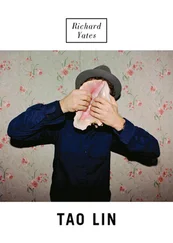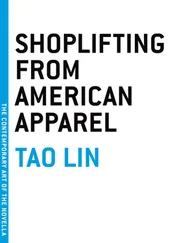The transparency and total effort, with none spent on explanation or concealment or experimentation, of what the universe desired — to hug itself as carefully, as violently and patiently, as had been exactly decided upon, at some point, with gravity — was [something].
— until getting to “[something],” which he remembered using as a placeholder after trying combinations of synonyms for “affecting” and “confusing” and longer descriptions like “an actualized ideal, inside of which any combination of parts could never independently attain.” He stared at “[something]” and thought about saying “Klonopin” or “Xanax.” He thought about explaining the bracket usage. “The sentence I just read wasn’t supposed to be there,” he said. “I pasted it there by accident, I think. I’ll stop here, thank you.”
He sat next to Erin in the front row, then Mei-mei Berssenbrugge, a woman in her 60s, whose introduction included that she was married to Richard Tuttle — the artist Gabby said Daniel resembled — read poems for thirty minutes.
• • •
At a flea market, the next afternoon, after drinking the equivalent of six to eight cups of coffee — in the form of 24x condensed coffee, which they bought from Whole Foods and had never seen before, in containers reminiscent of toilet-cleaning liquid — they pretended to be Wall Street Journal reporters and recorded themselves interviewing strangers about Harry Potter and the Deathly Hallows: Part 1 . Erin meekly asked a large, young, thuggish-looking man and his smaller friend, both wearing backward caps, if they thought Darth Vader would “die in this one.” After a long pause the large man laughed and said “man, I don’t know,” and looked at his friend, who appeared expressionless, like he hadn’t heard anything that had been said.
“Darth Vader is Star Trek, not Harry Potter, ” said Paul in a weak form of the “the voice,” feigning he was remembering this aloud.
“No, no,” said Erin grinning. “Really?”
“ Star Wars, ” said Paul laughing a little.
“Oh, I don’t know, never mind, never mind, I need to check my notes,” said Erin shaking her head and grinning as she and Paul walked away mumbling to each other, attempting to parody, Paul felt, a stereotypical comedy in which two high-level professionals are egregiously demoted into positions where they struggle to regain their jobs while nurturing between them an unlikely romance and mutually learning the true meaning in life. Erin said she felt “a strong need to be on more drugs.” Without MDMA it was difficult to use “the voice,” without which they felt uncomfortable talking to strangers, improvising, feigning behavior, trying to be witty.
• • •
After ingesting their remaining Xanax, and more condensed coffee, they decided to drive to New Orleans, an hour away, because their flight to New York, from Baton Rouge, wasn’t until the next morning. It became dark suddenly, it seemed, during the drive. Erin expressed concern about Paul’s driving speed in residential-seeming areas. Paul encouraged her to nap (they’d both said they were sleepy, due to Xanax) and said he would be careful and, a vague amount of time later, became aware of a car that was parked, for some reason, on the street. After a few seconds of vague, unexamined confusion Paul realized the car, in the near distance, was stopped at a red light and abruptly braked hard, then harder, curling his toes with a sensation of clenching a fist. The screeching noise and forward thrust startled Erin awake, but she remained silent, seeming mostly confused. Paul drove sheep-ishly into a shopping plaza and parked near the middle of the mostly empty parking lot and turned off the car.
“I started feeling anxious before like where were we going and we were going fast and it was dark and you were running into things a little bit and I was scared and anxious and afraid,” said Erin in one breath of wildly fluctuating volume and inflection and affect that seemed out of control and arbitrary, then in retrospect like she’d virtuosically sung a popular melody faster than anyone had ever considered trying.
“Sorry,” said Paul with a worried expression.
“And I felt scared,” said Erin with a slight tremble.
“Sorry,” said Paul. “I’m really sorry.” After he apologized more times they walked holding hands across the parking lot. Erin said she only felt slightly interrupted when she woke, that she had been like, “wait, I don’t care, right now, about dying, but in the future I might not want to die.” In a confused, intrigued voice Paul said “in. . the future?”
“In the future I’ll—” said Erin.
“But if you’re dead you’ll be dead,” said Paul in a loud, murmurred, strangely incredulous voice that he felt aversion toward and confused by.
“What?”
“But if you’re dead you’ll die,” mumbled Paul in a quieter, slurred voice like a stroke victim.
“But I didn’t really want to die right then,” said Erin.
Around midnight, on the drive back to Baton Rouge, Erin said her father seemed to enjoy giving her Xanax and Adderall and that she used to get angry at him for smoking marijuana every night because it affected his memory and he would repeat himself — and, if stopped, would become defensive, argumentative — but now she didn’t try to change him anymore. Paul said his father’s default name for him, what he’d unconsciously say to get Paul’s attention or to reference Paul in conversation, was “baby” until high school, or maybe college, when it became “old baby”—in Taiwanese, where both words were one syllable — which was what he now called almost all people and animals, including Dudu, the toy poodle, Paul remembered, that his parents had bought sometime in the past year, after he visited in December.
Paul talked about the panicked-seeming, alienating emails his mother had sent him the past five months, beginning in June — when he had published nonfiction on the internet mentioning cocaine and Adderall — and increasing during his book tour, when more information connecting him and drugs (tweets soliciting drugs, a “contest” on his blog to discern from the livestreamed video what drug he was on during his San Francisco reading, the interview with Alethia on MDMA) got on the internet. The emails had seemed complicatedly, strategically composed (referencing movies, news articles, celebrities who’ve “ruined their lives,” etc.) to instill mostly fear and shame and a little guilt to reduce Paul’s drug use, for the exclusive benefit, Paul believed his mother believed, of Paul’s long-term happiness, which however Paul had repeatedly defined as “freedom” to do what he wanted and “trust,” from his friends and family, that he was doing what, based on everything he knew, would result in the happiest results for everyone involved, which was what she also wanted, he’d told her many times. Paul had stated ultimatums like “if you mention drugs one more time I’m not responding to your emails for the rest of the month,” which his mother had repeatedly agreed on and went against, saying she felt an obligation — that it was her duty — as a parent, to continue stating her disapproval. To an increasingly frustrated and, he sometimes suspected of himself, paranoid and distrustful Paul, the emails had begun, at some point, to tactically operate on, at the least, a base of reverse-reverse psychology, which was a cause of despair for Paul, who throughout had tried to stress — but seemed to have failed to convincingly convey — that their relationship would only worsen if they couldn’t communicate directly, without strategy or hyperbole or deception, while aware of himself often not communicating directly.
Читать дальше












